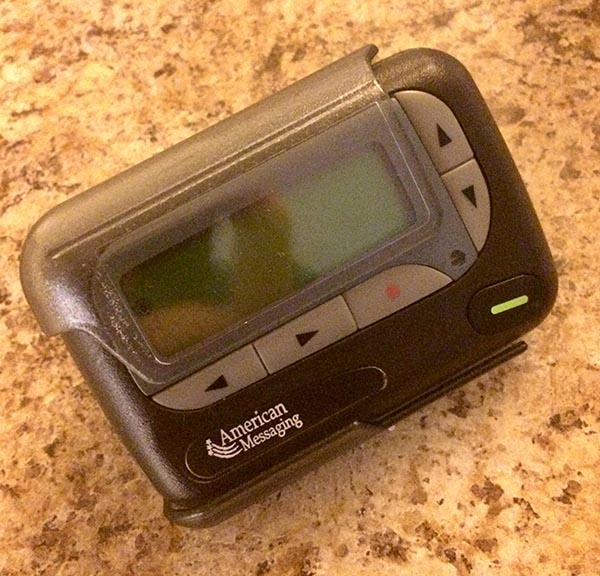Who Still Uses Pagers?
Though they’ve long since been replaced by cell phones, beepers have more uses today than you might realize.
By Jessie Schiewe
There are still 5 million pagers in service around the world today. (Art: Trav)
When pagers were introduced in 1950, they were large and bulky, weighing almost half a pound. Over time, they shrank, in both price and size, and became more commonplace. What was once a status symbol within the medical profession became a necessary life hack for everyone, and by 1994, there were more than 61 million pagers being used worldwide.
But ever since the advent of cell phones in the late 20th century — and now, with smartphones and texting apps — pager use has been on a steady decline.
There are currently around 5 million pagers in service worldwide, and with each passing year, we see and more beeper users converting to cell phones.
But pagers also have strengths that newer technology lacks. They’re less expensive than cell phones, and easier to revive when they die — you just pop in new batteries.
Another advantage is that they send messages with VHF (very high frequency) radio signals, giving them better coverage in places with poor reception, such as large indoor complexes, basements, closed studios, and remote areas.
And while most pagers offer only one-way communication, that, too, has its advantages.
Compared to smartphones, beepers offer virtually no distractions to the user. They’re a simple, fast, and efficient means of disseminating information, enabling users to cut straight to the point instead of partaking in time-consuming back-and-forth messaging.
Their unique qualities are largely why people still use pagers today.
A now-vintage advertisement for pagers from 1983. (Flickr/Rhys Moult)
According to Jack Uniglicht, the sales manager for PagersDirect.net, everyday people may no longer have use for them, but a number of industries and professions still do.
“If you need to be convinced why you need a pager, you don’t need a pager,” Uniglicht told OK Whatever. “Anyone who uses them has a specific intent and purpose.”
He knows of many businesses that have synced their beepers to their alarm systems or kept some around as back-up communication devices during emergencies.
Government contractors still use pagers because you oftentimes can’t enter a secure building with a cell phone, and the same can be said for those who work in prisons.
Dedicated bird watchers use pagers to quickly share information with each other about sightings.
People who work in remote outdoor locations, such as landscapers and field scientist, will often carry pagers because they’re more reliable than cell phones, which can lack service.
“People don’t realize that sometimes a text message is sent and it doesn’t come through for hours or maybe the next day,” Uniglicht explained. “But paged messages come through immediately — the minute you hit ‘Send,’ it’s going off.”
Beepers aren’t fossils yet, but for many of us, the days of checking a page and then making a phone call are but a distant memory. (Flickr/Michael Coté)
Older car washes, built in the ‘90s and early 2000s, utilize pagers, too. If a piece of machinery malfunctions, the tiny device will send out an alert about the structural issue.
Pagers can even save businesses from losing money.
“If there’s a large manufacturer and they’re making 1,000 widgets a minute on a conveyor system and something malfunctions, they can be out thousands of dollars for every minute that system is down,” Uniglicht said. “So they need to be alerted immediately, which is one of the benefits of a pager.”
They’re also good options for kids. In this day and age, parents want to stay connected with their children, but sometimes smartphones — with their high price tags, numerous distractions, and stranger-danger potential — aren’t the best option.
“If you have a 10-year-old and he’s out with his friends, you’re not going to buy him an iPhone for $800 dollars and pay $70 bucks a month for an unlimited plan,” Uniglicht added. “But if you gave him a pager it’s a whole different story. There are all kinds of unique situations where pagers make sense when a phone wouldn’t.”
Amongst all beeper users, there is one industry in particular helping to keep the messaging device relevant: healthcare. Pagers were originally created as a communication tool for doctors in busy hospitals, and today it is still largely doctors — as well as ambulance crews, emergency responders, and nurses — who use them.
In fact, as of 2016, an estimated 90 percent of hospitals still used pagers, according to a joint study by HIMSS Analytics and TigerText.
When Mark Sundahl started his psychiatry residency at Kansas University Medical Center a few years ago, he received a pager with his new role. As a millennial who grew up in the ‘90s and early 2000s, he was more used to using a cell phone and had little experience with the archaic device.
“It was actually kind of annoying because there’s only four total buttons on it and you have to do fairly complicated things with it, like change the text settings or change the vibration,” Sundahl said. “But I figured it out eventually.”
Sundahl’s hospital-issued pager which he must wear everyday on-the-job. (Photo: Mark Sundahl)
Though he never imagined using one for his job — in fact, he can’t even recall seeing a pager in real life before receiving one for his work — Sundahl has learned to appreciate the quirky contraption and its many strengths.
For one, it helps save lives.
“If you start dying in the hospital, it’s through the pager that you are saved,” he said.
Pagers also helps preserve a certain level of etiquette on-the-job. Unlike text messages, pages don’t necessarily require responses back. But as more and more hospitals switch to using paging apps on cell phones instead of real pagers, Sundahl worries the change could create awkwardness between doctors and their patients.
“It just looks more rude to use your phone,” he explained.
Answering a medical page on one’s cell phone can, to an outsider, look like you’re sending a personal text message even if you are discussing work.
“Do you have to specify every time that you’re actually answering an important page, so that people don’t think you’re rude?” Sundahl wondered. “It gets complicated.”
And even though most people under the age of 20 might be baffled by the tiny devices doctors clip onto their belts, Sundahl has a different take on them.
“I think you look pretty formal messing with a pager. People are more likely to think, ‘Oh, he’s doing official business.’ ”
A Motorola Bravo Flex pager from 1997. (Flickr/gurmit singh)
Change in any industry is inevitable — even in healthcare which is notoriously slow at upgrading technology. Sundahl wouldn’t be surprised if hospitals ended up phasing pagers out for good in the near future. But such a change, he thinks, probably won’t happen for at least a few more years.
“There are so many old-school people — doctors and otherwise — in the medical field that still use pagers. Some of them miss the days when paper charts were used instead of the current electronic medical record (EMR) system. So, as long as paging works best for them, they’ll probably continue keeping them around.”
As for Sundahl, he doesn’t mind using his pager for a little while longer. He’s even gotten used to the device’s ear-piercing sounds.
“It’s really loud,” he said, “much louder than a phone alarm.”
But he’s grateful for it, too. At least with a pager, he knows he’ll never sleep through an important message.


















